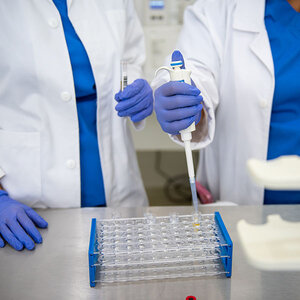Gates Foundation, PEPFAR, USAID, UNITAID Finalize Partnership to Cut Price of TB Test
The Bill & Melinda Gates Foundation, the United States President's Emergency Plan for AIDS Relief (PEPFAR), the U.S. Agency for International Development (USAID), and UNITAID have announced an agreement that will significantly cut the cost of a new rapid diagnostic test for tuberculosis in high-burden and developing countries (HBDC).
The partnership will fund a 40 percent reduction, from $16.86 to $9.98, in the price of Xpert MTB/RIF cartridges in a hundred and forty-five countries for ten years. Although the World Health Organization recommended the highly accurate TB test, which is produced by molecular diagnostic company Cepheid, in 2010, to date the high unit cost has prevented widespread adoption of the test in low- and middle-income countries. To make the price reduction effective immediately, the Gates Foundation has agreed to fund an initial payment of $3.5 million to the company.
Smear microscopy, the method currently used to detect TB in most laboratories in developing countries, is ineffective for diagnosing the disease in patients who are co-infected with HIV and for detecting drug-resistant strains of the disease. The Xpert MTB/RIF assay makes these diagnoses in less than two hours and can be used in remote areas because it is self-contained and requires no specialized training. Given that TB is the leading cause of death among people living with HIV in Africa, greater access to the test will significantly boost the capacity of healthcare workers to reduce transmission of and premature deaths from the disease. The incremental scaling of the test in high-burden countries could enable the rapid diagnosis of seven hundred thousand cases of TB and save health systems more than $18 million in direct health costs.
"We are pleased to be working with the Bill & Melinda Gates Foundation, PEPFAR, USAID, and UNITAID to make our innovative Xpert MTB/RIF test available for patient management in 145 HBDCs at less than $10 per test," said Cepheid CEO John Bishop. "As a result, every investment in GeneXpert technology in [HBDCs] will go further to identify patients with tuberculosis or drug-resistant tuberculosis, the first critical step in reducing the shocking mortality rates associated with this deadly disease."






